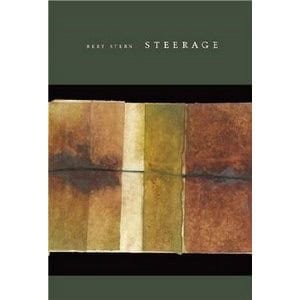Bert Stern – Steerage by Bert Stern

Steerage was the place deep in the hold, well below deck, windowless, where, for centuries, they put cattle that had to be carried across the ocean. When the great waves of migration came to the U.S., the thousands of dirt-poor peasants rode there as well. Down there, asks Bert Stern s ancestor in the title poem of Steerage, Who knew where to go to the toilet, if there would be water? In a corner, on blankets, we made house. The crowding, the noise, the smells of stale seawater and p..s, / animals and human sweat, made the gorge rise. One woman called it Gehenna, hell, but they all went down into the hold anyway and most of them made it to America. That s where this remarkable book of poems starts, with such memory as Stern can piece together, or imagine, of what brought his ancestors, driven out of Russia by pogrom, to a life in Buffalo. All suffered to bring me here to this room where I write, bigger than the house my mother was born in. I am somebody s dream. Let them/ tell me if they can . . . if I am recompense for what they endured. Steerage also plays on the verb, to steer, to guide. This is the defining act of these poems. In the long absence of those who suffered to bring me here, late in life, with death almost a friendly companion, the poet moves gingerly but expertly between his fears and longings, between then and now. Myself, he says in Blackberries, I don t go back much further than last Tuesday s two a.m., but I smell my elders almost benign around me, and I eat the berries they send forth as seed. More than anything else, Bert Stern s poems find a way to wear the great heaviness of life with a charitable lightness. In a rare comic moment, a rabbi approaches the speaker asking for a donation to SPEJS, the Society for the Permanent Elimination of Jewish Suffering. I gave already at the office, says the speaker. What office? I can t explain. . . . It s outside history. Only God is outside history, says the rabbi, but wanting proof anyway, he takes off his black coat and fake beard and slips them over the speaker. You can show me now, says the rabbi trickster. Stern, too, emerges as his own self-made rabbi (in a long tradition, it would seem), oracle or exegete of that sacred place outside history where the dead go and the dying long for. One of the most moving poems of this collection, Wait, placed next to last, tells of Jacob who sat by a girl, a girl who was dying in his heart, the soul you might say of Jacob himself, to whom he says, Wait . . . Listen. He knew a thin song that birds steer by. And Jacob sings it slowly, easing the girl, himself, the girl and (or as) himself, out of the world by recalling it. God is sleeping but He is coming. Now. Wait. Remember a leaf. Remember the turnip s sweet spheroid, its little tail. Say how stars live, burning. How the stony icicles of this grotto live, drip, drip, as if breathing. Fire and ice. And, yet, as he says in Testament, Even now children are being born. Or, in White-Throated Sparrow : Always a white-throated sparrow singing on a mountaintop, and somebody there listening to it for the first time. That’s what you need to believe . . . The survival manuals don t tell us how to survive life itself, the harness of daily living, the distance between ourselves and what we hope for. This is why Steerage is a book to cherish.
- Wydawnictwo:
- Ibbetson Street Press
- data wydania:
- 22 czerwca 2008
- liczba stron:
- 93
- kategoria:
- albumy
- język:
- angielski





